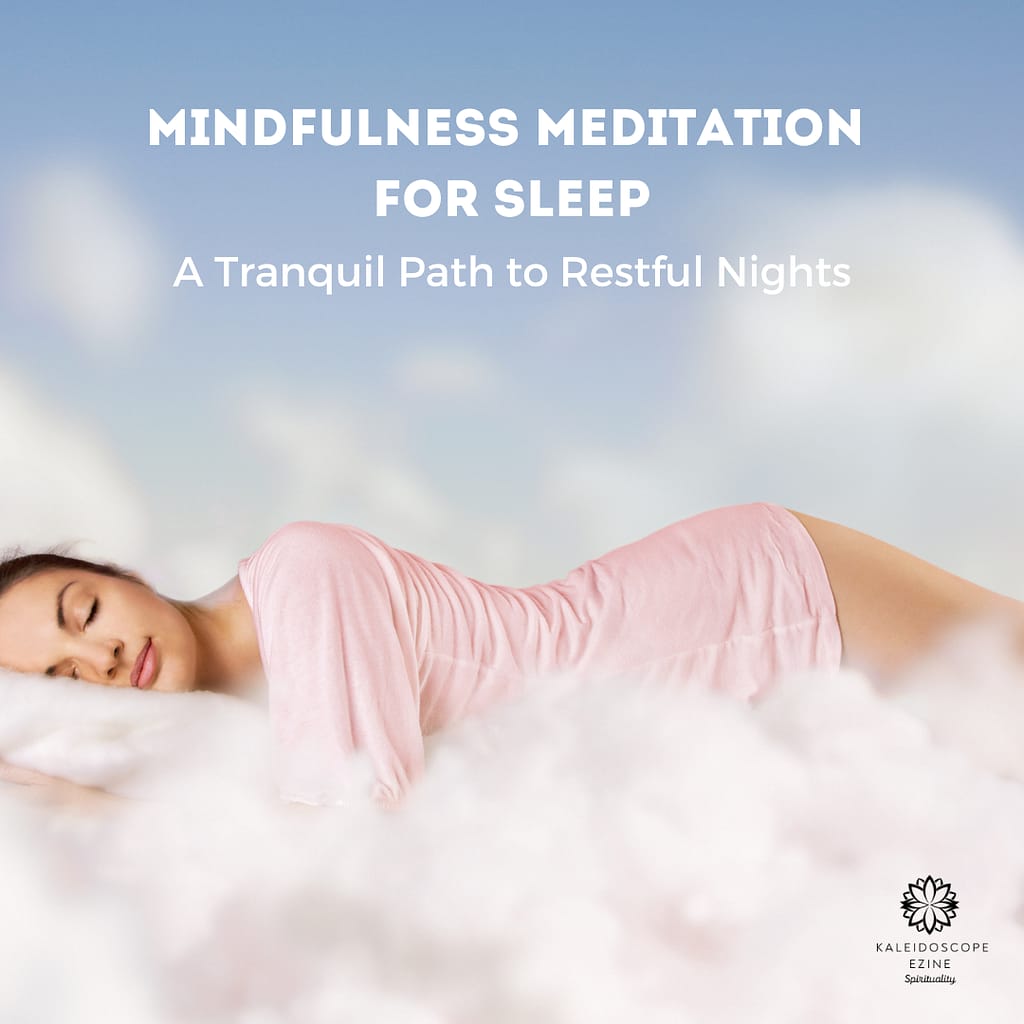In our fast-paced modern lives, finding a peaceful slumber can often feel like chasing a distant dream. The demands of work, social commitments, and personal responsibilities can leave our minds racing, making it challenging to wind down and achieve the restful sleep we so desperately need. This is where mindfulness meditation for sleep emerges as a powerful tool to guide us toward tranquility and rejuvenation. In this article, we’ll explore the concept of mindfulness meditation, its benefits for sleep, practical ways to incorporate it into your nightly routine, and how it can foster a deeper connection between mind and body.
Understanding Mindfulness Meditation
Mindfulness meditation is a practice rooted in ancient Hindu and eventually, Buddhist traditions, that have gained immense popularity in recent years for their profound impact on mental and emotional well-being. At its core, mindfulness meditation involves paying deliberate attention to the present moment without judgment. It encourages individuals to observe their thoughts, feelings, bodily sensations, and the surrounding environment with acceptance and curiosity.
As you begin to practice mindfulness meditation, you develop your capacity to become an impartial observer of life, especially your thoughts and emotions. Rather than being consumed by the constant chatter of your mind, you learn to detach from it, allowing thoughts to come and go like clouds passing through the sky. This practice develops a state of mindfulness where you can fully experience each moment, rather than being lost in regrets of the past or anxieties about the future.
The Benefits of Mindfulness Meditation for Sleep
In today’s hyperconnected world, we are glued to screens all day and sometimes even the night, where constant notifications interrupt our peace, sleep has become a precious commodity. Incorporating mindfulness meditation into your pre-sleep routine can offer plenty of benefits, helping enhance the quality of your sleep and overall well-being:
- Reduced Stress and Anxiety: Mindfulness meditation promotes relaxation by shifting your focus away from worries and stressors, helping calm the mind and create a conducive environment for sleep.
- Enhanced Sleep Quality: Practicing mindfulness can lead to improved sleep patterns, helping you fall asleep faster, stay asleep longer, and experience deeper, more restorative sleep cycles.
- Quieting the Mind: By training your mind to let go of racing thoughts, mindfulness meditation paves the way for a quieter mental landscape, perfect for easing into slumber.
- Cultivation of Awareness: Mindfulness increases self-awareness, allowing you to better understand your body’s signals and needs, including when it’s time to rest.
As you embrace mindfulness meditation for sleep, you’ll find that its benefits extend beyond the nighttime hours. The self-awareness and sense of calm you cultivate during your practice can positively influence your daytime activities as well. As a result of its ripple effects, you experience improved focus, enhanced emotional regulation, and a greater ability to navigate life’s challenges with more composure.

Incorporating Mindfulness Meditation into Your Nighttime Routine
1. Create a Tranquil Space
Prepare your tranquil space or sleep sanctuary by creating a clean space, dimming the lights, and eliminating distractions before your bedtime. Consider adding soothing elements such as soft cushions, candles, or soothing aromas like lavender to enhance the atmosphere. Transform your bedroom into a haven of serenity, a place where the worries of the day gradually melt away as you prepare for rest.
2. Wind Down Gradually
Transition from your daily activities to bedtime by engaging in calming rituals. This could involve reading a book, taking a warm bath, or sipping on a cup of herbal tea. Allow these activities to serve as a bridge between the hustle and bustle of your day and the peaceful stillness you’re aiming to cultivate.
3. Mindful Breathing
Begin your meditation practice by focusing on your breath. Breath is your link to the body and often during the day, we are in the mind in the past or future. Inhale deeply through your nose, feeling your chest and abdomen rise, then exhale slowly through your mouth. Notice the sensation of each breath without judgment. If your mind starts to wander, gently guide your attention back to your breath, without criticizing yourself for losing focus.
4. Body Scan Meditation
Progress into a body scan meditation, where you systematically direct your attention to different parts of your body, observing any tension or discomfort. Gradually release any tightness you experience. This practice not only relaxes your body but also fosters a sense of connection between your mind and physical sensations.
5. Cultivate Gratitude
Consciously shift your focus to positive emotions by reflecting on moments of gratitude. This can help replace stress with a sense of calmness, creating a peaceful mindset conducive to sleep. Consider keeping a gratitude journal by your bedside, where you can jot down a few things you’re thankful for each night.
6. Letting Go of Thoughts
As thoughts arise during your meditation practice, acknowledge them without attachment (without getting into the story of the event), and gently guide your attention back to your breath or the chosen focal point. Over time, this practice can help you detach from the flow of thoughts, enabling mental clarity before sleep. Remember that meditation is not about not thinking of anything but about observing your thoughts and allowing them to flow without becoming engaged in them.
Embracing Restful Nights Through Mindfulness
In a world that often glorifies constant hustle, prioritizing sleep has become an act of self-care and preservation. Mindfulness meditation for sleep offers a holistic approach to unwinding, fostering a connection between mind and body that paves the way for rejuvenating slumber. With regular mindful practices, you can unlock the door to a realm of serenity and rest, where each night becomes an opportunity to embrace the gift of sleep and wake up revitalized each morning.
Incorporating mindfulness meditation into your sleep routine requires patience and consistency. Just as you wouldn’t expect immediate results from a single workout session, the benefits of mindfulness develop gradually with regular practice. As you embark on this journey, remember that there’s no “one-size-fits-all” approach. Experiment with different techniques and variations to discover what resonates most with you and what works best for you.
So, why not embark on this journey of self-discovery and tranquility tonight? Your well-rested self will thank you for it. Through mindfulness meditation, you can reclaim your nights, restore your energy, and cultivate a profound sense of well-being that ripples throughout your days. The path to restful nights begins with a single breath – a breath that carries you into the embrace of sleep’s gentle embrace.


